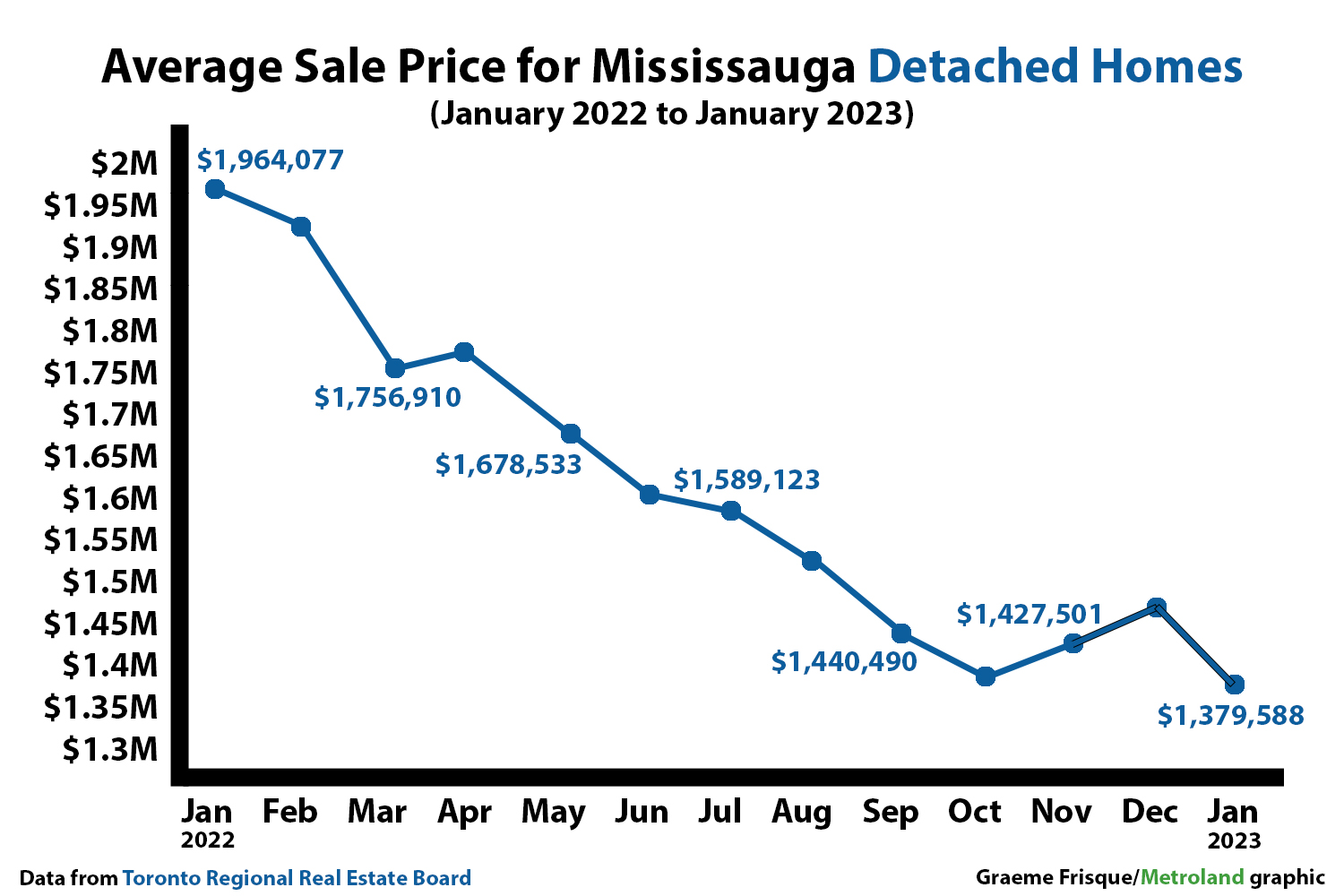Real eState
Average price for Mississauga real estate lowest in 2 years after nearly $600K year-over-year drop for detached homes
|
|
The average price for real estate in Mississauga fell to its lowest mark in two years last month as increased borrowing costs continued to drive prices down.
The latest monthly GTA real estate market statistics from the Toronto Real Estate Board (TRREB) showed an average sale price for all dwelling types combined of $920,587 in January. The last time Mississauga’s overall average was lower than that was in January 2021 at $890,020.
Real estate prices nearly doubled in four years, climbing from a combined average of $644,834 in February 2018 to a peak of $1,225,339 for all dwelling types combined in February 2022.
Since then, the market has gone into a steep decline, losing 24.9 per cent in value in just the past 11 months.
Detached and semi-detached homes have seen the sharpest declines
The average price for detached homes peaked out at an average price of $1,964,077 in January 2022. Last month’s average of $1,379,588 represented a 29.7 per cent year-over-year drop. The last time the average price for detached homes in Mississauga was below $1.4 million was in November 2021 at a monthly average of $1,318,779.


The average price for semi-detached homes peaked in February 2022 at $1,314,703 and has fallen by $398,759 — or 30.3 per cent — to an average of $915,944 last month.
Townhouse-style condominiums also peaked in February 2022 at $1,012,860 and have since fallen by 21.2 per cent to a January average $797,702. Likewise, apartment condos fell from a February 2022 peak of $736,006 to $626,401 last month, marking a 14.9 per cent drop.
While those price declines have led to the lowest combined average real estate price seen in Mississauga for two years, it hasn’t translated to an increase in sales — quite the opposite.
Real estate sales in Mississauga last month were by far the lowest January total since TRREB started sharing records in 1996 at just 262 total transactions. The lowest January sales total prior to last month came in 2009 with 311.


TRREB has attributed the drop in sales and prices to the Bank of Canada (BoC) raising its benchmark interest rate from 0.25 per cent to 4.5 per cent since March of last year.
“Home prices declined over the past year as homebuyers sought to mitigate the impact of substantially higher borrowing costs,” said TRREB chief market analyst Jason Mercer in the organization’s monthly analysis.
“Home sales and selling prices appear to have found some support in recent months. This coupled with the Bank of Canada announcement that interest rate hikes are likely on hold for the foreseeable future will prompt some buyers to move off the sidelines in the coming months,” added TRREB president Paul Baron.
However, in the wake of the BoC’s most-recent 0.25 per cent rate hike on Jan. 25, BoC governor Tiff Macklem warned that the central bank foresees continued downward pressure on the housing market through at least the first half of the year. And that the rate increase pause is dependent on higher interest having the desired effect of slowing the economy and taming inflation.
“We are pausing interest rate hikes to assess whether we’ve raised interest rates enough to get inflation all the way back to target,” Macklem said while speaking to reporters in Quebec.
“The fact that we’ve paused may bring people back into the market. These are things we’re going to have to watch,” he said.
Despite recent declines in prices, home ownership in the GTA remains out of reach for most without qualifying for and assuming significant debt far above and beyond what has been traditionally considered financially prudent.
Regardless, both TRREB and the BoC are counting on increased immigration to increase housing demand again as early as the second half of 2023.
“Record population growth and tight labour market conditions will continue to support housing demand moving forward,” said Baron.





Real eState
Judge Approves $418 Million Settlement That Will Change Real Estate Commissions – The New York Times


A settlement that will rewrite the way many real estate agents are paid in the United States has received preliminary approval from a federal judge.
On Tuesday morning, Judge Stephen R. Bough, a United States district judge, signed off on an agreement between the National Association of Realtors and home sellers who sued the real estate trade group over its longstanding rules on commissions to agents that they say forced them to pay excessive fees.
The agreement is still subject to a hearing for final court approval, which is expected to be held on Nov. 22. But that hearing is largely a formality, and Judge Bough’s action in U.S. District Court for the Western District of Missouri now paves the way for N.A.R. to begin implementing the sweeping rule changes required by the deal. The changes will likely go into full effect among brokerages across the country by Sept. 16.
N.A.R., in a statement from spokesman Mantill Williams, welcomed the settlement’s preliminary approval.
“It has always been N.A.R.’s goal to resolve this litigation in a way that preserves consumer choice and protects our members to the greatest extent possible,” he said in an email. “There are strong grounds for the court to approve this settlement because it is in the best interests of all parties and class members.”
N.A.R. reached the agreement in March to settle the lawsuit, and a series of similar claims, by making the changes and paying $418 million in damages. Months earlier, in October, a jury had reached a verdict that would have required the organization to pay at least $1.8 billion in damages, agreeing with homeowners who argued that N.A.R.’s rules on agent commissions forced them to pay excessive fees when they sold their property.
The group, which is based in Chicago and has 1.5 million members, has wielded immense influence over the real estate industry for more than a century. But home sellers in Missouri, whose lawsuit against N.A.R. and several brokerages was followed by multiple copycat claims, successfully argued that the group’s rule that a seller’s agent must make an offer of commission to a buyer’s agent led to inflated fees, and that another rule requiring agents to list homes on databases controlled by N.A.R. affiliates stifled competition.
By mandating that commission be split between agents for the seller and buyer, N.A.R., and brokerages who required their agents to be members of N.A.R., violated antitrust laws, according to the lawsuits. Such rules led to an industrywide standard commission that hovers near 6 percent, the lawsuits said. Now, agents will be essentially blocked from making those commission offers, a shift that will, some industry analysts say, lower commissions across the board and eventually force down home prices as a result.
Real estate agents are bracing for pain.
“We are concerned for buyers and potentially how we will get paid for working with buyers moving forward,” said Karen Pagel Guerndt, a Realtor in Duluth, Minn. “There’s a lot of ambiguity.”
The preliminary approval of the settlement comes as the Justice Department reopens its own investigation into the trade group. Earlier this month, the U.S. Court of Appeals for the District of Columbia overturned a lower-court ruling from 2023 that had quashed the Justice Department’s request for information from N.A.R. about broker commissions and how real estate listings are marketed. They now have the green light to scrutinize those fees and other N.A.R. rules that have long confounded consumers.
“This is the first step in bringing about the long awaited change,” said Michael Ketchmark, the lawyer who represented the home sellers in the main lawsuit. “Later this summer, N.A.R. will begin changing the way that homes are bought and sold in our country and this will eventually lead to billions of dollars and savings for homeowners.”
Under the settlement, homeowners who sold homes in the last seven years could be eligible for a small piece of a consolidated class-action payout. Depending on how many homeowners file claims by the deadline of May 9, 2025, that could mean tens of millions of Americans.
Real eState
Two matching megacomplexes to totally transform Toronto neighbourhood
|
|
A pair of twinned proposals aim to completely redefine the skyline of Toronto’s midtown area with an architectural statement that would set the neighbourhood apart from other high-rise clusters in the city.
Two separate proposals from developer Madison Group at 110 and 150 Eglinton Avenue East have been resubmitted to city planners, calling for two pairs of mixed-use condominium towers with standout designs unlike anything that exists in the city today.
In a surprising twist from a developer not exactly known for breaking the bank on architecture, the proposals now boast brand-new complementary designs from acclaimed firm Rafael Viñoly Architects.
The 110 Eglinton site, currently home to a pair of mid-rise office buildings, would be demolished and built out with two 58-storey towers.
A few doors to the east, the 150 Eglinton site includes a handful of mid-rise and low-rise commercial buildings along Eglinton, wrapping around Redpath Avenue. These buildings would also be demolished and replaced with a pair of 61-storey towers.
All four towers will feature matching designs boasting red aluminum cladding forming vertical piers that accentuate the towers’ heights, though there will be some key differences between the pairs at 110 and 150 Eglinton.


150 Eglinton East
The 58-storey towers at 110 Eglinton East will be linked via an enormous floating bridge spanning levels five through 10, framing a large open public space below and supporting an elevated residential amenity floor above.


The 61-storey towers lack a skybridge, but will also feature amenity levels with panoramic views, including spaces on the 28th and 40th floors.


At heights of just over 236 metres, these four towers all stand taller than anything that exists in the neighbourhood as of 2024.
The combined proposals would add a staggering 3,364 condominium units to the neighbourhood, along with new retail and office space to maintain employment uses along this evolving corridor.


One standout of the proposals is a series of privately-owned publicly accessible spaces measuring over 5,000 square metres across the combined sites.


Among the publicly-accessible spaces proposed are the aforementioned area below the bridge at 110 Eglinton, along with pedestrian walkways that will allow foot traffic to filter through the block between Eglinton and Roehampton Avenue to the north.


It’s the type of proposal one would expect to be met with significant local backlash. However, early feedback from the neighbourhood is surprisingly positive.
Local city councillor Josh Matlow took to X to voice his support for the project, calling it “genuinely exciting.”
“The architecture is beautifully designed,” said Matlow, hyping up locals with a promise that renderings of the new public space would wow the community. It’s remarkable for our community and city — like bringing Rockefeller Center to midtown Toronto,” said Matlow.





Real eState
This Toronto home is a ’90s decor trip but a steal at only $600K
|
|
If you’re a millennial and grew up in the ’90s, you’ll probably remember a fair amount of ’90s home decor trends that might still haunt you to this day.
There were sponge-painted walls, all-beige everything, wallpaper borders, oak cabinets, carpets in places where there shouldn’t be carpets, bedroom sets from big-box stores, Southwestern or Tuscan decor in homes that weren’t in Arizona or Italy, and the list goes on.
We thought we’d left those troubling times in the past, but 39 Hatherley Rd. really brings back all those memories.


The front porch.
Somehow this two-bedroom, one-bathroom house hit almost every ’90s trend, except for carpets in the bathroom (phew!).


The entryway.
What’s weird is this house has changed ownership a few times since the 90s. In fact, it was most recently purchased in 2010 for $250,000.


The living room.
So it’s somewhat surprising that when you look at past listing photos, almost nothing has changed. In fact, it seems they added the sponge-painted walls in 2010.


The kitchen.
But despite 39 Hartherley Rd. being a total throwback, this house is, as the listing says, “a diamond in the rough.”


The backyard.
First off, it’s a detached house with a 125-foot deep lot in a good location.


The kitchen has plenty of storage but, sadly, no dishwasher.
The main floor has a living room and kitchen with enough space for a dining table.


The main floor.
The layout is a bit awkward but the Dutch door off the kitchen is too cute.


The back patio.
Off the kitchen is a laundry room/mud room that leads to the spacious backyard.


The primary bedroom.
Upstairs, there are two decently sized rooms and a small bathroom.


The second bedroom.
The house definitely needs some updating but the roof was done in 2015, the furnace is only a few years old, the electrical has been updated, and there’s room for expansion.


A fireplace in the living room.
Also, a coat of paint will do wonders to brighten up the all-beige ’90s aesthetic.


The small bathroom.
However, the biggest selling point of this home is the price point.


The back of the house.
39 Hatherley Rd. is listed for only $599,999, which is almost unheard of in Toronto, even if this place will probably go for closer to $700K.





-



 Health13 hours ago
Health13 hours agoRemnants of bird flu virus found in pasteurized milk, FDA says
-
Art19 hours ago
Mayor's youth advisory council seeks submissions for art gala – SooToday
-



 Health17 hours ago
Health17 hours agoBird flu virus found in grocery milk as officials say supply still safe
-



 Investment18 hours ago
Investment18 hours agoTaxes should not wag the tail of the investment dog, but that’s what Trudeau wants
-



 Science22 hours ago
Science22 hours agoiN PHOTOS: Nature lovers celebrate flora, fauna for Earth Day in Kamloops, Okanagan | iNFOnews | Thompson-Okanagan's News Source – iNFOnews
-
News18 hours ago
Peel police chief met Sri Lankan officer a court says ‘participated’ in torture – Global News
-
Art19 hours ago
An exhibition with a cause: Montreal's 'Art by the Water' celebrates 15 years – CityNews Montreal
-
Art18 hours ago
Penetang couple 'saddened' after complaint forces folk art removal – MidlandToday




